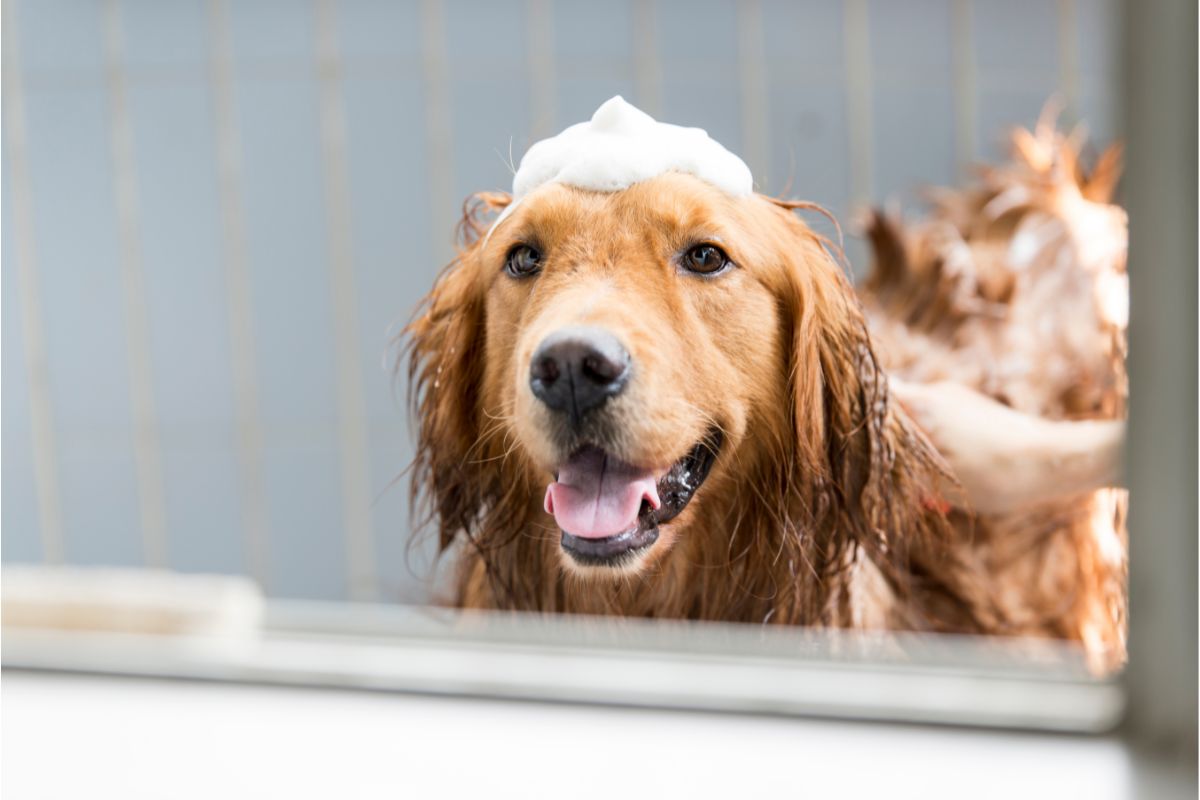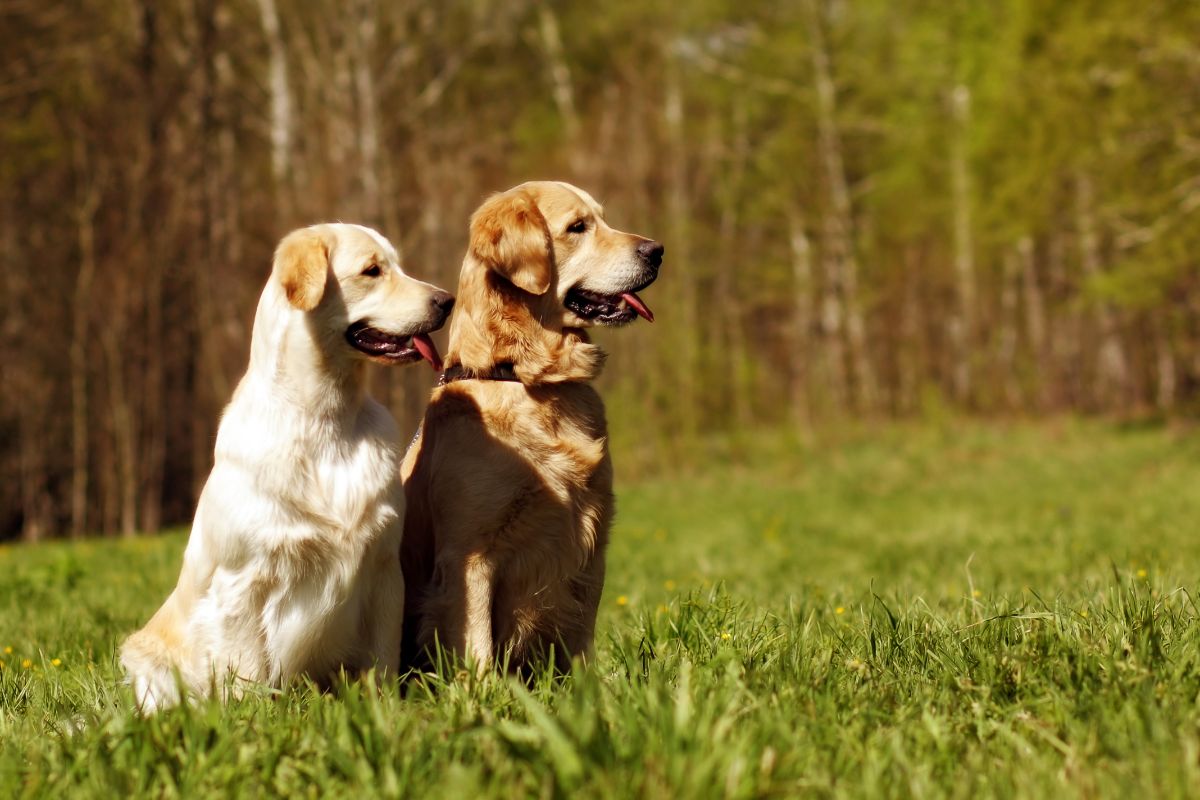Dogs, like us, can feel stressed and anxious. If you’ve started to notice that your Golden Retriever is showing signs of anxiety, it’s crucial to lend them a supportive paw.
In this guide, I’ll share some practical, everyday ways to help your anxious furry companion feel more secure and at ease.
From creating a calming routine to understanding their body language, we’ll explore actionable tips together that cater to your Golden Retrievers’ unique needs.

Your four-legged friend deserves a stress-free, happy life, and I’m here to guide you every step of the way.
How Can I Tell If My Golden Retriever Is Anxious?
Spotting anxiety in your Golden Retriever is key to offering timely support. Watch for subtle cues like excessive panting, pacing, or excessing licking.
Is your furry friend avoiding eye contact, or perhaps, displaying a lowered tail? These could all signal unease.
Listen to their vocalizations – whining or whimpering, especially without an obvious trigger, may indicate stress or anxiety.
You’ll also need to keep an eye on changes in appetites or sleep patterns. If they’re sleeping more or eating less (or the other way around), this could be a sign that something’s not quite right.
If your usually sociable Golden becomes unusually withdrawn or clingy, it’s time to pay attention.
In the end, trust your instincts; if something feels off, it probably is, and a vet visit may be in order so you can determine whether there’s something medical going on or whether it is indeed stress.
Figuring Out Where The Stress Is Coming From
To truly help your anxious Golden Retriever, let’s pinpoint the root of their stress. Start by observing their behavior in various situations. Is it triggered by specific sounds, environments, or interactions?
Consider recent changes in their routine or environment, like a new pet or a shift in your schedule. If you’ve had a set routine for a while, a sudden change could be a major trigger in some dogs.
Sometimes, health issues can contribute, so a vet check is valuable so you can rule out anything more nefarious.
Keep in mind that, with their heightened senses, your dog could be sensitive to changes you might not have noticed, so even if there isn’t anything obvious, that doesn’t mean your dog is anxious for no reason.
Once you’ve pinpointed potential stress factors, you can tailor your approach to alleviate specific concerns.
Maybe your Golden Retriever is uneasy during thunderstorms (my Bella HATES them) or anxious when left alone.
Implementing gradual exposure to anxiety-inducing situations before they’re unavoidable is a fantastic way to reduce your dog’s stress in the long run.
Soothing An Anxious Golden Retriever
Alright, let’s dive into the nitty-gritty of comforting your anxious Golden Retriever.
First things first, establish a routine. Dogs thrive on predictability, so feeding, walks, and playtime should follow a consistent schedule. This routine provides a sense of security that can work wonders in calming their nerves.
Next, create a cozy, den-like space. Designate a quiet, comfortable spot where your furry friend can retreat when feeling overwhelmed.
It could be a corner with their favorite bed or blanket, offering a safe haven for moments of stress. Dog crates work really well for this.
Introduce positive associations by incorporating toys or treats to make this space extra appealing.
Keep the environment chill. Golden Retrievers are known for their friendly disposition, but loud noises or chaotic surroundings can trigger anxiety.
Consider calming background sounds, like soft music or white noise, to create a serene atmosphere, especially if you notice that your dog is particularly anxious.

Also, pay attention to your own energy – remaining calm and collected can have a positive impact on your dog’s mood.
Physical activity is a golden ticket. Regular exercise helps burn off excess energy and reduces anxiety.
Engage in activities your golden loves, whether it’s a game of fetch, a leisurely walk, or a good ol’ belly rubbing session.
Physical affection, coupled with mental stimulation, strengthens your bond and promotes relaxation.
Finally, if none of this works or you notice your dog getting worse, consult with a vet. Your vet can offer tailored solutions, such as behavior modification techniques or, if necessary, medications to alleviate your Golden Retriever’s anxiety.
Remember, every dog is unique, so finding the right combination of strategies may take some time. However, with patience and love, you can help your furry friend find peace of mind.
The Final Woof
Know that supporting your anxious Golden Retriever is a team effort between you, your vet, and anyone else you live with.
By incorporating these practical tips into your daily routine, you’re actively contributing to your dog’s well-being. Remember, patience is key, and consistency is your best ally.
Your furry friend relies on your understanding and care, so stay attuned to their needs. From establishing comforting routines to creating a safe space, each step you take brings you close to a happier, calmer canine companion.
With love, attention, and a sprinkle of playfulness, you’re not just a pet owner – you’re a source of comfort and joy for your Golden Retriever.
Frequently Asked Questions
Positive reinforcement works best. Reward calm behavior and use desensitization to gradually expose your dog to stressors.
Some dogs benefit from supplements or medications. Consult with your vet to discuss options and determine the most suitable approach.
Yes, but introduce new experiences gradually. Positive interactions with other dogs and people can build confidence over time.
Create a safe space, use noise-masking sounds, and consider anxiety wraps. Desensitize your dog to loud noises through positive associations.








